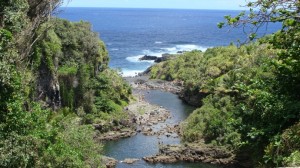Ocean and Atmospheric Agency Funds UH Marine Projects
By Reid Cairme (***Reid is a news/media intern, from Kamehameha Schools – Maui. Edited by Wendy Osher, News Director)
Hawaii’s congressional delegation announced the award of $2,275,356 to the University of Hawai’i for the conservation, protection and monitoring of Hawaii’s marine environment.
Senator Daniel K. Inouye, Senator Daniel K. Akaka, US Representative Mazie K. Hirono and US Representative Colleen Hanabusa joined in making the announcement on Tuesday.
“I have been proud to support scientific research and educational programs throughout my career that improve our lives through discovery and development. These grants will advance efforts to protect our environment, resources, and communities from both man-made and natural threats such as climate change and tsunamis. I will continue to support these and similar programs that work with local agencies and organizations to make a more secure Hawai’i,” said Sen. Akaka.
The funding is provided by the National Ocean and Atmospheric Administration through six grants. A portion of the funds will be used to increase public understanding of tsunamis and warming ocean temperatures.
The six grants are:
1. National Tsunami Mitigation Program and National Weather Service Tsunami Ready Program — $478,055: Coastal zones are considered high priority for tsunami risk communication, education and training programs. The State of Hawai’i will study the effects of local and distant tsunamis through new tsunami modeling and mapping technology and preform outreach to provide awareness to the special needs population.
2. Western Pacific Fisheries Information Network — $445,000: WPFIN provides technical and operational support to participating fishery agencies who supply timely, accessible and best-available information to scientists, researchers, and managers within the Joint Institute for Marine and Atmospheric Research, University of Hawai’i, NOAA fisheries, and Western Pacific Fisheries Management Council. The data is used to maintain the WPFIN central database system and its web pages.
3. Assessment and Management of Western Pacific Coral Reef Fishery Ecosystems and Habitat — $351,000: The Western Pacific Regional Fishery Management Council’s Coral Reef Conservation Cooperative Agreement includes three activities which address coral reef fishery management in the Pacific islands. The first activity supports a Coral Reef Ecosystem Coordinator who will oversee the activities in the grant proposal and report to the council on any coral reef ecosystems and habitats in the Western Pacific Region. The second activity will develop coral reef fishery stock assessment models to analyze existing data on a single species or family group. The last activity will work with a contractor to determine coral reef ecosystem genetics and connectivity in the Pacific islands.
4. Profiling CTD Float Array Implementation and Ocean Climate Research — $346,548: This proposal will support the global Argo array of 3,000 profiling CTD floats through testing, deployment, and management of a subset of these floats and to preform scientific analysis including estimates of ocean heat variability using the float and other data.
5. Human Dimensions of Fishing and Marine Ecosystems in the Western Pacific — $329,000: This JIMAR project seeks to collect and analyze sociocultural information relevant to current and pending fisheries management and marine ecosystem issues in the Western Pacific region. This project has several activities and areas of focus: a survey of resident users at Hawai’i coral reef priority sites; updates of fishing community profiles produced by JIMAR and NOAA Pacific Island Fisheries Science Center; and cooperative research examining potential socioeconomic effects of the 2011 adoption of annual catch limits for managed marine species in US-managed waters.
6. Protected Resources Environmental Compliance Initiative — $325,753: PRECI supports the JIMAR theme of achieving a sustainable balance between the forces of coastal development and conservation/preservation goals by conducting research and performing outreach and education. Research will be used to assist resource managers in directing further investigation in habitat and protected species, enhancing inter-agency cooperation, performing outreach and education, and protected species conservation and recovery.
*** Supporting information courtesy: The office of US Senator Daniel Inouye.











